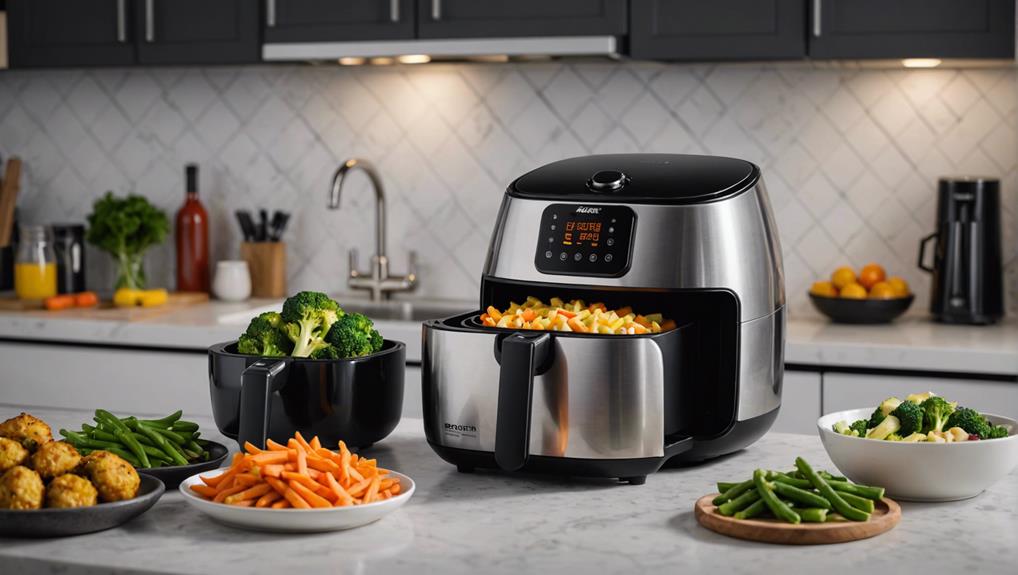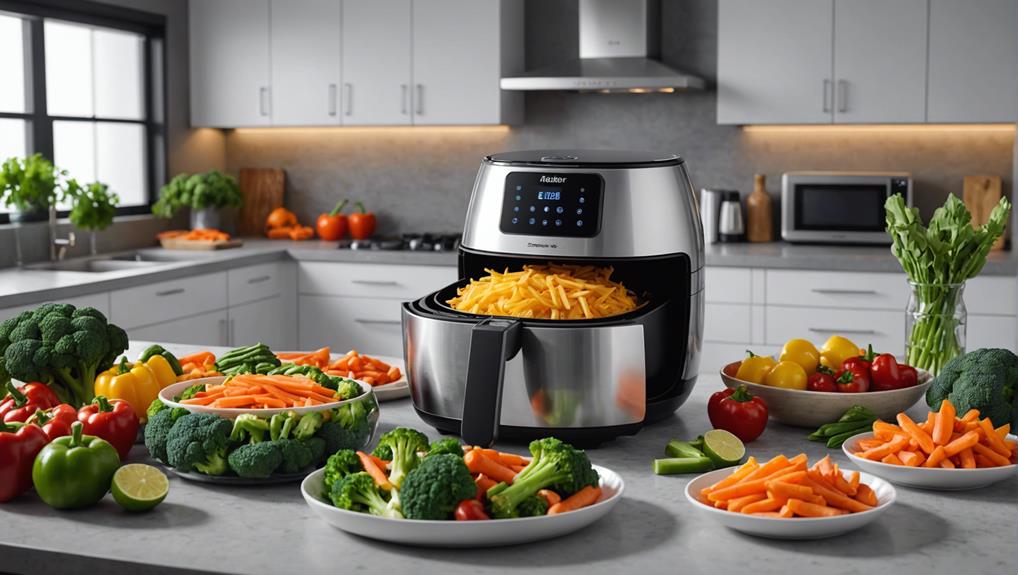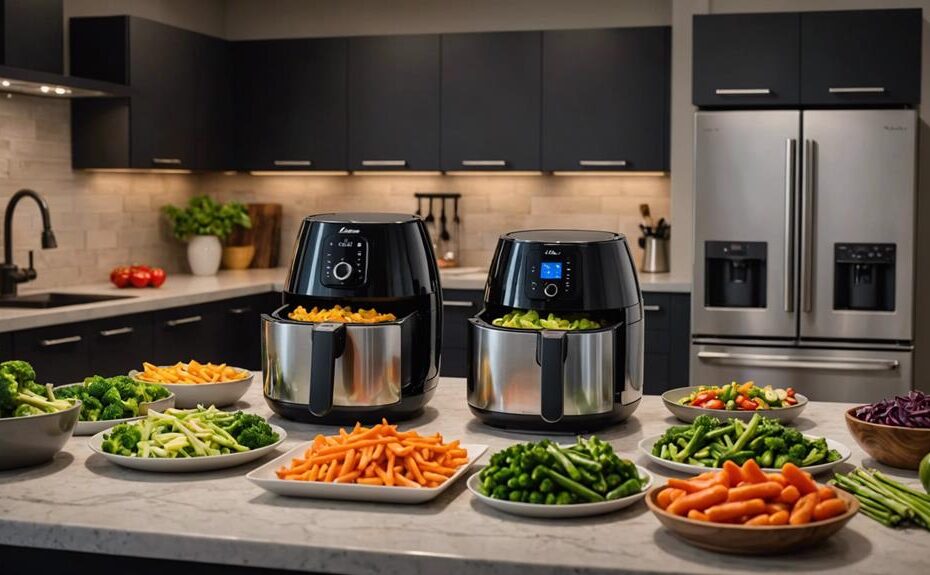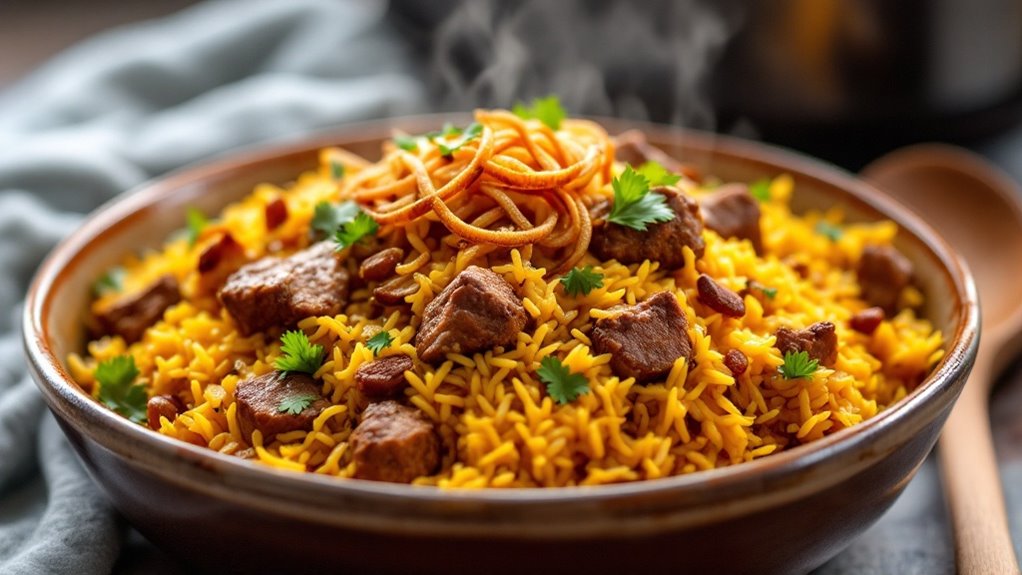Yes, air fryers are great for cooking frozen vegetables. They use hot air circulation to cook your veggies quickly and evenly, preserving essential vitamins and minerals. Since only minimal oil is needed, air frying helps guarantee fat intake reduction while achieving a crispy texture. Remember to preheat the air fryer and avoid overcrowding the basket; this guarantees even cooking and nutrient retention. Seasoning halfway through enhances flavor. Ideal vegetables for air frying include broccoli, green beans, and cauliflower. By following these guidelines, you'll enjoy convenient and nutritious meals. Discover more tips to optimize your air frying experience.
Key Takeaways
- Air fryers cook frozen vegetables quickly and evenly using hot air circulation.
- Minimal oil is required, reducing fat intake while achieving a crispy texture.
- Rapid cooking time in air fryers helps preserve essential vitamins and minerals.
- Air fryers provide a convenient and straightforward method for preparing frozen vegetables.
- Preheating and proper seasoning enhance the flavor and nutritional value of air-fried vegetables.
Benefits of Air Frying Frozen Vegetables
Air frying frozen vegetables guarantees more nutrients compared to traditional cooking methods, making it a healthier choice. When you use an air fryer, you benefit from the hot air circulation that cooks frozen vegetables quickly and evenly. This rapid cooking time helps preserve essential vitamins and minerals. Unlike methods that require boiling or steaming, air frying needs minimal oil, reducing unnecessary fat intake and making it a healthier side dish for any meal.
Using an air fryer to cook frozen vegetables offers a convenient and straightforward solution. You can achieve a crispy texture without the excessive use of oil, enhancing both taste and nutritional value. The hot air ensures that the vegetables are cooked uniformly, eliminating the risk of sogginess that often comes with other methods.
Additionally, the easy air fryer setup makes it perfect for preparing vegetables in the air within minutes, making it an ideal choice for busy lifestyles. Whether you're looking to whip up a quick healthy side or simply enjoy the benefits of nutrient retention, air frying frozen vegetables provides a simple and efficient way to enhance your meals with minimal effort.
Best Practices for Air Frying
To achieve the best results when air frying frozen vegetables, start by preheating your air fryer to ensure an even cooking temperature. This step is essential for ensuring that your veggies cook evenly and reach the ideal cooking temperature quickly. Preheating helps retain nutrients more effectively compared to traditional methods.
Once your air fryer is preheated, place the frozen vegetables in the basket. The typical cook time for frozen veggies in an air fryer is around 20 minutes. This method is excellent for quick crisping without needing to thaw, preserving both texture and nutritional value.
Seasoning is another key aspect of air frying. For enhanced flavor, add your preferred seasonings halfway through the cook time. This approach prevents overpowering the vegetables and allows the flavors to meld well.
Following these best practices—preheating your air fryer, adhering to the recommended cook time, and seasoning midway—ensures your frozen vegetables are cooked to perfection. By doing so, you not only achieve quick crisping but also retain nutrients and enhance flavor. These steps will help you make the most out of your air fryer when preparing frozen vegetables.
Common Mistakes to Avoid

When air frying frozen vegetables, one common mistake is overcrowding the basket, which hinders even cooking and reduces crispiness. To get the best results, avoid overcrowding the air fryer basket so that hot air can circulate freely around each piece. This guarantees that your vegetables cook evenly and attain a desirable crisp texture.
Another pitfall to watch out for is thawing the vegetables before cooking. Thawing can make the veggies soggy and compromise their texture. Instead, cook frozen vegetables directly from the freezer to maintain their firmness and prevent sogginess.
Preheating the air fryer for about 5 minutes before adding your frozen vegetables is also essential for achieving consistent and ideal results. A preheated air fryer helps in maintaining a steady temperature, which is crucial for even cooking.
Adjusting the cooking time is important as well. Firmer frozen vegetables may require a few extra minutes to cook thoroughly. Always check their doneness and adjust accordingly to avoid undercooked or overcooked veggies.
Lastly, season your vegetables halfway through the cooking process. This allows the seasoning to adhere better and ensures a more balanced flavor, avoiding over or under seasoning.
Seasoning Tips for Vegetables
Seasoning frozen vegetables appropriately can greatly enhance their flavor and nutritional appeal, making them a delightful addition to any meal. When using an air fryer, start by tossing your frozen vegetables in a bit of olive oil. This not only helps them crisp up nicely but also allows seasonings to adhere better. Commonly used seasonings like salt and pepper are crucial for a balanced flavor profile.
For an extra burst of taste, consider adding garlic powder or onion powder. These spices blend well with most vegetables and can elevate their natural flavors. Herbs such as rosemary and thyme are excellent choices, providing a fragrant and savory touch that pairs well with air-fried veggies.
Experimenting with different spices can keep your meals exciting. Try paprika for a smoky flavor, cumin for an earthy taste, or Italian seasoning for a Mediterranean twist. Adding these midway through cooking ensures even distribution and allows the flavors to meld perfectly.
Properly seasoned frozen vegetables in the air fryer can transform into a delicious, nutrient-rich side dish or snack, making it easier to enjoy your daily servings of vegetables.
Recommended Vegetable Types

After mastering seasoning techniques, it's important to know which vegetables are best suited for air frying to achieve the perfect texture and flavor. When it comes to cooking frozen veggies, certain types excel in the air fryer. Broccoli florets, okra, green beans, cauliflower, and sweet potatoes are highly recommended vegetable types. These vegetables maintain their texture and flavor exceptionally well when air fried, making them ideal for a quick and healthy meal.
The air fryer's high heat and circulating air guarantee that these vegetables cook evenly and crisp up without the need for excessive oil. This cooking method not only enhances the flavor but also preserves the nutrients in your air fryer vegetables, providing a delicious and healthy side dish or snack. Broccoli and green beans become delightfully crunchy, while cauliflower and sweet potatoes develop a satisfying, crispy exterior.
Moreover, these recommended vegetable types are versatile and can be seasoned in various ways to suit different taste preferences. Whether you're aiming for a spicy kick or a savory blend, air frying these frozen veggies results in nutrient-packed, delightful dishes that are both convenient and nutritious.
Frequently Asked Questions
Can You Cook Frozen Veggies in an Air Fryer?
Yes, you can cook frozen veggies in an air fryer. Preheat if necessary, use a bit of oil for seasoning adherence, and cook at 400°F for 15-20 minutes. Stir frequently to guarantee even cooking and nutrient retention.
Why Are My Air Fryer Veggies Soggy?
Just like a crowded subway car, overcrowding the basket restricts airflow, so your veggies get soggy. Use minimal oil, preheat the air fryer, cook at high temperatures, and shake the basket. Guarantee proper ventilation and seasoning.
Is It OK to Directly Put Frozen Food in Air Fryer?
Yes, you can directly put frozen food in the air fryer. For best results, use proper temperature settings, preheating benefits, appropriate batch size, and seasoning tips. This method offers health benefits, avoids defrosting methods, and eases cleaning.
Are Vegetables Better in an Air Fryer?
When it comes to veggies in an air fryer, it's a win-win. You get nutrient retention, cooking speed, flavor enhancement, texture improvement, easy cleanup, minimal oil usage, energy efficiency, portion control, versatile cooking, and consistent results.
Conclusion
While microwaving frozen vegetables may be quick, air frying them offers a crisp texture and enhanced flavors. You'll benefit from the nutrient retention that air frying provides. Avoid common pitfalls like overcrowding the basket, and remember to season creatively for the best taste. With the right techniques, air frying becomes a healthier and more delicious way to enjoy your favorite frozen vegetables, turning a simple side dish into a gourmet experience.
Disclosure: As an Amazon Associate, I earn from qualifying purchases.



